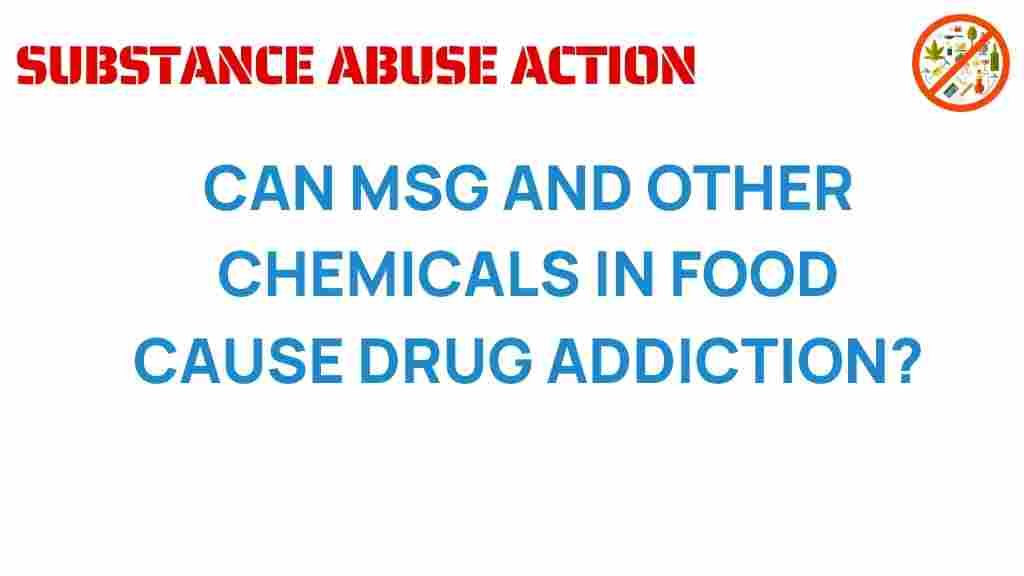Can MSG and Food Additives Fuel Hidden Addictions?
In today’s fast-paced world, food has become more than just sustenance; it’s often a source of comfort, pleasure, and even addiction. Many people may not realize that the **MSG** (monosodium glutamate) and various **food additives** present in their favorite meals can play a significant role in fostering these hidden addictions. This article will delve into how these substances can affect our cravings, the health impacts associated with them, and their relationship with **neurotransmitters** and diet.
Understanding MSG and Food Additives
MSG is a flavor enhancer commonly used in processed foods, restaurant dishes, and snacks. It enhances the umami taste, making foods more appealing. However, **food additives**, which include preservatives, colorings, and sweeteners, are used to improve the shelf life, appearance, and taste of products. While these ingredients make meals more palatable, they can also lead to unintended consequences.
The Science of Addiction
The concept of addiction is not limited to substances like drugs or alcohol; it can also apply to food. Understanding the connection between **food additives**, **addiction**, and **cravings** requires an exploration of behavioral science and how our bodies respond to these chemicals.
- Neurotransmitter Activity: Chemicals like MSG can influence the levels of neurotransmitters in the brain, particularly glutamate, which is involved in the brain’s reward pathways. This can lead to increased cravings for foods containing these additives.
- Conditioning and Habits: Over time, repeated exposure to highly palatable foods may condition individuals to seek out these flavors, creating a cycle of cravings and consumption.
- Emotional Responses: Eating comfort foods that contain MSG can trigger emotional responses, leading to a psychological reliance on these foods to cope with stress or anxiety.
The Health Impacts of MSG and Food Additives
The health impacts of consuming MSG and other **food additives** are a topic of much debate. While some studies suggest that these substances are safe in moderation, others raise concerns about their potential effects on health and behavior.
Potential Health Risks
- Weight Gain: Foods high in **MSG** and additives are often calorie-dense and may contribute to overeating, leading to weight gain and obesity.
- Metabolic Disorders: Some research indicates a link between MSG consumption and metabolic disorders, including insulin resistance and type 2 diabetes.
- Neurological Effects: High levels of glutamate have been associated with neurotoxicity, which could impact brain health over time.
Cravings and Behavioral Science
Cravings for foods high in **MSG** and additives can be better understood through the lens of behavioral science. When we consume these foods, our brains release dopamine, a neurotransmitter associated with pleasure and reward.
How Cravings Develop
- Reinforcement: The pleasurable experience of eating foods with **MSG** can reinforce the desire to consume those foods again, leading to habitual consumption.
- Withdrawal Symptoms: Reducing or eliminating these foods can lead to withdrawal-like symptoms, including irritability and increased cravings.
- Social and Environmental Factors: Availability and social settings can also influence cravings, as certain environments may trigger the desire for specific foods.
Step-by-Step Process: Recognizing and Managing Addictions to Food Additives
If you suspect that you may be developing an addiction to foods containing **MSG** or other additives, consider the following steps to manage your cravings and improve your dietary habits.
Step 1: Self-Assessment
Begin by keeping a food diary to track what you eat and how you feel after consuming certain foods. Note any patterns of cravings or emotional eating.
Step 2: Educate Yourself
Learn about the ingredients in your food. Familiarize yourself with common **food additives** and their potential effects. This knowledge will empower you to make informed choices.
Step 3: Gradual Reduction
Rather than eliminating all **MSG** and additives at once, gradually reduce your intake. This can help mitigate withdrawal symptoms and make the transition smoother.
Step 4: Seek Alternatives
Replace processed foods with whole, natural foods. Focus on fruits, vegetables, lean proteins, and whole grains that do not contain additives. This shift can help satisfy cravings without the adverse effects of **chemical exposure**.
Step 5: Address Emotional Eating
Consider strategies for coping with stress and emotions that do not involve food. Practices such as mindfulness, exercise, or talking to a therapist can be beneficial.
Troubleshooting Tips for Food Cravings
Even with the best intentions, cravings for **MSG** and **food additives** can be challenging to overcome. Here are some troubleshooting tips to help manage those cravings:
- Stay Hydrated: Sometimes, cravings can be mistaken for thirst. Drink plenty of water throughout the day.
- Eat Balanced Meals: Ensure your meals include a balance of macronutrients—proteins, fats, and carbohydrates—to help maintain stable blood sugar levels.
- Mindful Eating: Practice mindful eating by paying attention to your food, savoring each bite, and recognizing when you are full.
- Distract Yourself: Engage in activities that keep your mind and hands busy when cravings strike, such as reading, exercising, or pursuing a hobby.
Conclusion: Taking Control of Your Diet and Health
Understanding the impact of **MSG** and **food additives** on cravings and potential **addiction** is crucial for making healthier dietary choices. By recognizing the psychological and physiological factors at play, individuals can take proactive steps to manage their cravings and reduce their reliance on these substances.
Ultimately, creating a balanced diet that prioritizes whole foods not only supports better health but also helps in overcoming hidden addictions. If you find yourself struggling, consider reaching out to a professional for guidance. For more information on maintaining a healthy diet, visit this resource.
By taking control of your diet, you can foster a healthier relationship with food and improve your overall well-being. Remember, small changes can lead to significant improvements in your health and lifestyle.
This article is in the category Addiction and created by SubstanceAbuseAction Team
